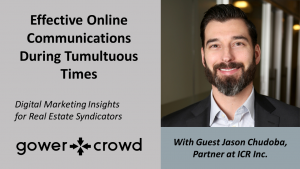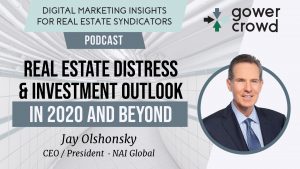Chris Loeffler, CEO of Caliber
How to Thrive During a Real Estate Downturn
 Chris Loeffler, CEO of Caliber
Chris Loeffler, CEO of Caliber
My guest today, Chris Loeffler, is CEO and co-founder of Caliber, a real estate company based out of Scottsdale in Arizona.
What Chris is doing that is different from any other company that I'm aware of is that is selling shares in the operating company that itself holds multiple other real estate services companies, including those that directly invest in real estate projects. Put another way, Chris is using regulation A Plus exactly the way it was contemplated by Congress when they passed the Jobs Act in 2012. Find out more about Chris and Caliber in the links at the bottom of this page.
What You're Going to Learn
- Reg-A Offerings as a Pre-IPO
- WIIFM Tell Me Why to Invest
- Opportunities and Threats in the Market
- How Certain Asset Classes Are Performing During COVID-19
- How to Determine When to Buy a Distressed Asset
- Launching a Reg-A to Non-Accredited Investors
- An Opportunity Zone Investment Provides Potential Tax Savings
- Biggest Challenges and Opportunities in Real Estate Now
- And much more!
Listen To or Watch the Full Podcast Here
Show Highlights
FOR REAL ESTATE DEVELOPERS
THE WHITE BOARD WORKSHOP
Learn the exact system best of class sponsors use to raise money online.
Reg-A Offerings as a Pre-IPO
ADAM GOWER: Right now, you're doing a Reg-A aren't you? Tell me something about that because this is something you actually turned me onto, however many years ago it was. I had to spend a lot of time researching what the heck it was you were talking about then. I do know a little bit more about it now. But tell me, you've got another couple of offerings, don't you, going out?
CHRIS LOEFFLER: Yeah. So, the way to think about Caliber is, think of a very, very, very small version of a Blackstone. We have an operating company that runs the business and earns a profit sharing on our assets and our funds as we perform. And then we have funds which are all private companies, limited partnerships typically, that the investors typically invest in. So, for the first time in the history of Caliber, we're allowing people to invest in the operating business, the parent company, the same company I own stock in, and for a minimum of $2,000, they can go online and invest in our Reg-A offering and they don't have to be accredited, which is also the first time in the history of our company that we've allowed for that. And what it is, at the end of the day, you know, there's a lot of different terms for it, but it's a pre-IPO offering. It's a pre-IPO offering that allows an investor to buy stock, prior to a public listing, in a company, and they don't have to be Goldman Sachs.
ADAM GOWER: Wait, wait, wait, so why is it, I got to cut you off. Why is it "pre-IPO"? A Reg-A basically, it is, it's a, you know, I've heard it termed "a mini IPO". I mean, that's basically, basically it's a public offering, isn't it?
CHRIS LOEFFLER: It is, you know, it's a offering of common stock that's publicly available. The difference is, the choice the company makes on: are they going to list that stock on the OTC, on an exchange, or are they going to list the stock on the Nasdaq or the New York Stock Exchange? If they want to list it on a senior exchange, which is the Nasdaq or the New York Stock Exchange, then they're typically going to go through a secondary transaction, which is what Caliber is doing. And the benefit to that is, if I just take my Reg-A stock and list it online, I haven't gotten an underwriter involved, I don't have anybody that can support the stock in the aftermarket. I'm going to have a hard time attracting analysts coverage. And so, you know, my crowd might buy my stock at $4 a share, but I might list it and it goes nowhere or it starts to degrade over time because there's no volume in stock. So, we think a smarter path is to issue the Reg-A first, let our crowd and everybody who's followed us for decades, you know, invest now and then issue a second offering through an S-1, which is basically taking the same document we just got qualified by the SCC, modifying it in some ways and refiling it again and then doing an underwritten IPO with a traditional investment bank. So we're raising basically raising two rounds of capital. One at $4 a share and an underwritten IPO at a different price that will hopefully be higher than $4 a share in about a year.
WIIFM Tell Me Why to Invest
ADAM GOWER: Fascinating. Okay, and that will allow you to list on the major exchanges once you do that.
CHRIS LOEFFLER: Yeah and so in exchange for the illiquidity of the fact that you're buying this investment now and you can't trade it, hopefully you're getting the upside of coming in early into the company's life cycle and these pre IPO rounds get invested in all the time. They just don't get invested in by you and me. You know, we don't have access to this or at least I'm making an assumption about you. I don't have access to those. So this is one of the first times in the history of the country where a company with my business model is offering this form of stock.
ADAM GOWER: Fascinating. So Chris, what I want to know. So that's the mechanics.
CHRIS LOEFFLER: Yeah.
ADAM GOWER: And as you well know, nobody buys a single share of anything until the one most important question is answered. That's the WIIFM question, the WIIFM – What's In It For Me? So tell me, what is today the value? You're launching this thing in the heat of a major battle. What is the value proposition? What's in it for me to buy your stock?
CHRIS LOEFFLER: So the way that Caliber makes money is, is the value proposition. And once you understand the mechanics of that, you can see how your stock value grows. At the end of the day, we're trying to grow the value of your stock, period. That's what everyone wants to do for ourselves and for every other shareholder. So the way that we make money is that we earn fee income in about seven or eight different income streams every time we raise capital into our private funds. So we have a capital raising engine. The more capital we raise in the different funds that we own, a piece of that capital is basically attributable to us in the form of profit sharing interests and various fees. So, last year we raised 90 million. The year before that, we raised 50. The year before that, we raised 39. So every year, we've been able to raise more and more capital and there are things that have happened at Caliber that have, fundamentally we hope, will increase our ability to raise even more. The more we raise, the more the value of Caliber's operating company grows and the more the stock goes from $4 to $5 to $6, etc. So you're buying into a business that has a business model where you bring in lots and lots of money that is non- diluted to your stock
CHRIS LOEFFLER: and the more we raise over here, the more deals we do, the more successful those deals are, the more you make over here. So what accelerates that process? There's two things. One, a further move into alternatives. So the more people become more and more interested in real estate and real estate alternative investing, the more our business model grows. And if you believe, as I believe, that we're just at the beginning of that stage and that the 74 million baby boomers that are retired right now, looking for income, are going to want to buy income property, and that's a good play. The other thing that drives it is cheaper pricing, which allows us to drive better returns and better deals. We're already starting to see that in the market, that, because of coronavirus, there are going to be buying opportunities. We're looking at a hotel that we can buy for almost a 50 percent discount to what we could have bought it for, four months ago. That, you and I know from 2008, that's pretty rare. So we're starting to see that come back. And if you want to be a part of that, there's really two ways to do that in the Caliber world. One is by buying stock and two is by investing at the fund level.
Opportunities and Threats in the Market
ADAM GOWER: So tell me something about what you're seeing in the market as far as the operating, because you've got a bunch of different entities. You've got a brokerage, you've got a development company, asset management. I mean, you're full stack real estate company.
CHRIS LOEFFLER: Yeah. You name it. We do it.
ADAM GOWER: So where is the, so tell me, where are the opportunities and where are the threats to each one of those pillars that lie underneath the main corporate entity?
CHRIS LOEFFLER: So on the acquisition side, it's pretty obvious hotels and retail are going to be a nice buying opportunity.
And there's unique and special situations. I don't think it's going to look like 2008 did where we had years and years where people could get in and buy something relatively cheap and figure it out. The banks, during that last financial crisis did a lot to create infrastructure in the financial institutions to deal with another crash. So the difference is, while the asset values may crash and there may be people that have to give up their assets or do workouts or whatever, those are going to get processed a lot faster than they did in the past. And only, I think, in my opinion, the insiders who have a lot of volume and are in regular communication with these banks will be able to get access to deals and its going to be a very different environment. So, on the acquisition side, we dropped about 500 million dollars worth of deals that we either had an LOI or escrow or some version of negotiation of diligence and just walked away from every deal about two months ago. And now, we've turned all of our effort into reconnecting with lenders, special servicers, bankruptcy attorneys, auction folks, everybody across the planet of the distressed environment because if the distressed market does appear, we know that it's going to be a much shorter and tighter window.
And if it doesn't appear, we'll go pick up the projects from the past again, you know, they'll still be around in the next couple months. And so, we're just trying to position ourselves in that way. On the construction and development side, we're already seeing construction labor pricing is starting to come down. Materials pricing is a little wobbly because the supply chains are screwed up. But we think that those are eventually going to come down as well. And most people are just happy and fortunate to have a job if they do right now. It's a really sad time. So we're, from an investment company standpoint, you know, we're doing all we can to help out. We're giving away free rooms in our hotels to nurses and doctors just to give them a safe place to stay. You know, we're keeping our people employed, even though we don't have nearly as much for them to do right now but we know we will. So we're just, kind of, weathering the storm on that side. And the brokerage side, there's no transaction activity at al. On the lending side, there's very little activity at all. It's all just negotiations and workouts. But everybody expects, probably in the next couple of months, for the spreads to tighten, which basically means that the loan costs will come down and the more they come down, the more real estate becomes more and more attractive and that brings the buyers back.
FOR REAL ESTATE DEVELOPERS
THE WHITE BOARD WORKSHOP
Learn the exact system best of class sponsors use to raise money online.
How Certain Asset Classes Are Performing During COVID-19
ADAM GOWER: So there are two areas that I am interested in talking to you about and that is that you have real estate in, across a broad range of asset classes, don't you?
CHRIS LOEFFLER: Correct.
ADAM GOWER: And hotels, across everything. So tell me, of the range, you've talked about hotels, being opportunities there. But tell me about, and retail. But what about other asset classes like multi-family and offices and self-storage and all the other things that I know that you guys touch? What do you see happening in those sectors?
CHRIS LOEFFLER: We're into. I mean, on a weekly basis, watching what's happening with them. So far, all the multi-family is holding up. We've had a slight uptick in delinquency but nothing that would cause us to be concerned. One of our multi-family properties has a student component to it, and we were pretty worried about that one. And so far, we've only had, you know, 7 people out of 200, we've had to chase, which is not that much. On the self-storage side, same thing. Holding up just fine. People are continuing to pay their bills. We're watching for delinquencies coming into May because maybe that's when people will start being delinquent. But so far, so good. Office, our all our offices is doing fine except for one building. We're still trying to find a tenant for it but that's just, kind of, normal course of business stuff. And then we have some retail. But the retail that we have is contiguous to a university. It's kind of like a main street. It's not big box. And so that, we're still touring people through and people are looking to, you know, open stores and stuff because they see that by the time they get open 6-months to a year from now, you know, they're going to, they feel fairly confident to move forward. And so, that's one side of the equation. On the other side, it can get a lot worse if the government and the powers that be don't step in to create some relief for the CMBS CLO markets, mortgage REITs, private equity debt. Basically, all the relief that's been created, so far, only affects the banks. And so, while that's great, if you happen to have a bank loan, you know, 80 percent of hotels are probably funded by non-bank financing.
So all the other lenders are where they really need some help right now. And if they don't, you know, what most people don't understand is that, a mortgage ends up in one big bond right? And that bond is probably 5-20% hotel, 5-20% retail, you know, a piece of office, a piece of multi-family, whatever. So if, you know, 10-40% of that bond goes cancerous because those assets can't pay their their bills, then, you know, the bonds are going to have problems. And so I think that, I've never seen the level of proactivity coming out of the government so far, to try to address these situations. I've been on calls with congress people and senators and members of the White House, etc. And, you know, it's just us, you know, we're not that big of a deal. But, they want to know. They want the information from the frontlines. And when you talk to them and tell them and tell them, hey, I think you should do this, they've said, oh I've heard that from 7 other people and we're taking action. It's pretty impressive.
ADAM GOWER: So what is it that you do on? What are they responding positively to, Chris?
CHRIS LOEFFLER: One is, I'm trying to get them to think about how to create an off-ramp so that people who have hotels could refinance their hotels with their 2019 numbers and refinance into a bank loan, which is much more flexible than a CMBS loan or other loans. That would save the bond market and the CMBS loans and it would also put the hotels in a position to weather the storm and then come back out of this. So just suggestions like that, that we've been kicking up there.
Determine When to Buy a Distressed Asset
ADAM GOWER: So I was actually going to ask you about hotels. How do you, how do you service any kind of debt with an operating asset or an asset that requires cash flow. Right, like hotels, they've gone from basically near-zero cash flow and certainly below operating expenses so they're loss-producing entities at the moment. How do you, first of all, how do you value? How do you even determine that 50% is a good price on an asset that has zero, that is losing money every week.
CHRIS LOEFFLER: So, I'll give you my spiel on distressed assets. So in 2009, you have the same problem where you didn't know where the floor was. And so, who knew what was a good deal? Well, at some point in time, in real estate, there are fundamental floors in the real estate values. And so, one of those is, if I can buy something for less than 50% of what it cost to build, then at some point in time, there is an inherent value I can recapture, which is a recapture to replacement value. So that's one of those things. If you know what it costs to build something and you know what 50% of that is, and if you know your number is below that, then you've got upside. The other is on the income side, which a hotel is harder to predict but like a rental property. There was a time in 2006 when you could buy a rental property and the rental yield was 2% percent in Phoenix. But the mortgage rate was 5 1/2%. So clearly, you were in an overheated market. And then early 2009, that yield went from 2%, up 14%, and the mortgage rate was still 5%. And so you're saying, wow, you know, there's a spread that is so high that it can't get any worse and that's even after the rents came down 30% from their highs. And so, it's, you look at income spreads and you look at value regression, your replacement costs and if you can put those two things together and realize you're getting an outsized yield, in a normal market, and you're getting a better discount than what it would cost to build it, it's pretty easy to make that decision.
Launching a Reg-A to Non-Accredited Investors
ADAM GOWER: You are launching a Reg-A to non-accredited investors, to everybody. You and I might understand what you were talking about for 5 minutes but how do you explain that kind of sophisticated concept to somebody who has never had the opportunity to invest in real estate before? I may not know what a mortgage is, let's start with that, right?
CHRIS LOEFFLER: Right. You know what they do know? They do know what a good story is. They do know the story of Berkshire Hathaway. And so we tell stories and we draw comparisons. You know, Berkshire Hathaway, when it went public, didn't attract any institutional investor interest for years. They basically raised all their money and their stock offerings from what they called retail clients, which is individual human beings that were basically their customers and people that they had connectivity to. Wouldn't you have liked to have been one of the first 10,000 shareholders in Berkshire Hathaway?
ADAM GOWER: Right.
CHRIS LOEFFLER: That's one way to put it. I mean, we have a vision and a plan. It is a 100 year vision. We have investors that are investing with us for 10, 15, 25 years at a time, that are looking to pass shares down to their kids. And so, we have to have a long term outlook. And because of that, we can draw comparisons to a company like Berkshire that creates value along the way. That never really sell stock. It uses the money from the businesses it owns to buy more businesses and compound the returns. That's the same thing that we do in our model, or very similar to what we do in our model. So, we have a very similar financial model, in stock, to a Berkshire Hathaway. We're just a lot earlier stage. So that's one way to think about it. And, you know, the other way to think about it is, if all this stuff, this technical stuff sounds really interesting to you and you want to be an insider and you want to buy, like we do, and you want to buy foreclosure properties or go to buy, non-performing debt and that kind of stuff. You can't do it on your own, but you can do with us. Be a shareholder. Own the stock that I own.
An Opportunity Zone Investment Provides Potential Tax Savings
CHRIS LOEFFLER: Bottom line, we make enough from the fees to make a reasonable profit margin on the fees and employ our people. And what drives us is, when we get an asset to perform and produce distributable cash flow, we start to get a piece of the cash flow and when we sell it and we make a big profit for the client. So the main decision making thesis we go through is, raise capital, but by projects that will be profitable. Because if we buy projects that won't be profitable, the fees that we make is not enough to drive real profitability to Caliber. And so that's, you know, that aligns our interests to the interest of our private investors.
ADAM GOWER: Right. So what are the, what criteria are you looking for? I remember you talking about this when we were standing in front of the class, but I know it's changed as well. So what are the driving criteria for the kinds of deals you're looking at today?
CHRIS LOEFFLER: Yeah, it's pretty simple. If we're going to build something new or renovate it and do a like a really big turnaround, we want to double the value of our investment every five years. And that's essentially saying that two times equity multiple. So, we want to invest five million dollars. We want to transform a property. And we want to sell it for a price that gives us 10 million back at the end of the day. That could come through rents. That could come through the sale price or some combination of both. But it's the same model over and over and over again. In a distressed market, because we can buy so low, we can expect that to be three to four times our money.
ADAM GOWER: In 5 years. In 5 years.
CHRIS LOEFFLER: Yeah, every five years. If you're flipping, you can do much better than that but you never know if the flipping environment is going to come back or not. We'll see. But that's what we do. And you know, the other, if you think about my business, the main driver is generating long term sticky revenue and then big sale prices. Big returns over time. The federal government gave us another gift after they gave us the first gift of the Jobs Act. They gave us a second gift two years ago called Opportunity Zones.
ADAM GOWER: Right.
CHRIS LOEFFLER: It became one of the largest opportunities zone funds in the Southwest and one of the largest and most active opportunities on investors in the entire country.
And so, to put it into basic, digestible terms, an investor who has a short term or long term capital gain from the sale of any asset. Say they had a million dollars stock portfolio and sold it, or they had a building, real estate building that they owned or they had a business that they owned and they produced a capital gain. If they took that million dollars stock portfolio and sold it and three hundred thousand of that was a capital gain, that can be now taken and reinvested at $300,000 into an opportunity zone fund and that allows them to invest in real estate, inside certain zones, across the country and we take that and do what we do. We buy buildings, we build them from scratch. We renovate them. We do all kinds of different things to those buildings. And if we grow the value of that investment over time, it's a 10-year program. After 10 years, if that $300,000 is worth $600,000. Invest yourselves the $600,000 position that pays no tax on the sale and they pay a reduced amount of tax of their original tax bill. So the tax benefits to opportunities on investing are incredible. It's the best tax incentive that's that's existed in the history of the country for a long time and Caliber is one of the best positioned companies to put that to work.
Biggest Challenges and Opportunities in Real Estate Now
ADAM GOWER: You're launching a new Reg-A offering. This is one of the most extraordinary times for real estate. Your real estate career, if I remember correctly, was born out of the last downturn. An amazing, amazing story that I've heard and enjoyed many times. But what is, what are the biggest challenges today and what are the biggest opportunities, do you think, as as we look at, you know, the near term, the next 2-3 months and then the next year, 2 years?
CHRIS LOEFFLER: Biggest challenges today, by far, is going to be the fear in the market around this pandemic and the uncertainty that's driven from that and what that causes people to do. But decisions that causes people to make that are not the predictable ones, the predictable ones like, oh, they're going to work from home more often. That stuff's easy. We've already figured that out. What is the layer seven of the seven layer dip that no one has thought through yet? In my humble opinion, the only way that you are able to adjust to that, because nobody can really plan for this kind of a black swan event, is to be very active in the market, in constant communication with all participants. And that's what helps you navigate the ship. And, you know, I read a book that I love called the "The Clipper Ship Strategy". Basically, the metaphor is, you have to be a clipper ship. You have to move your ship constantly and re-adjust and tack with how the wind continues to blow because when you go through these periods of time, you can't have a 5-year strategic plan. You have to have a weekly strategic plan that changes over very short periods of time. So that is the biggest risk by far, is not seeing the change in the market and not adjusting accordingly.
The biggest opportunity is, I think, you're going to see a massive transfer of wealth from the older generation to the younger generation, because it's the younger generation, right now, that's investing heavily because they frankly don't care what happens in the next year or two. They know that buying an apartment complex and building value, and at a good price, over the next decade, is going to be how they build their wealth. So, I mean, we're even seeing that with the online investing crowd. The people who invest 0 to $25,000 are investing like crazy right now and their volume is at an all time high. The people who are investing $50,000 and $100,000, or more, are holding back. So, I think that there's going to be a huge wealth transfer. I saw it in 2008. We were young and smart enough to take advantage of it but not well positioned. This time around, I'm sitting on top of $500 million in assets, a machine that raises capital and the ability to deploy. I can't wait. I mean, this is going to be a fun opportunity for us because, you know, my worst case scenario is that things don't go poorly and I go back to doing what we were doing before.
Other Episodes You Might Like
A guide for remote workers
How to Setup a TV Studio Quality Home Office















